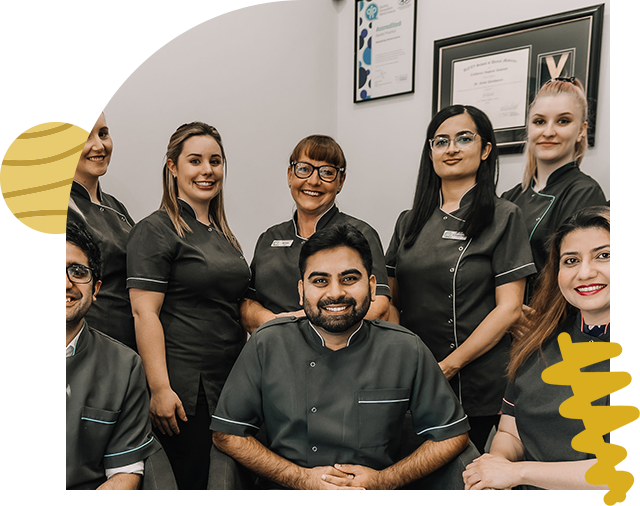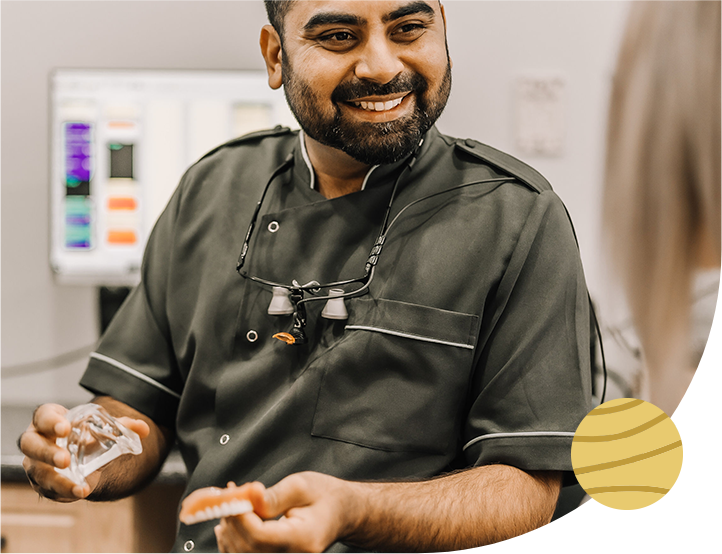Emergency Dentist in Brabham
Did you know that emergency dental care is now available in Brabham? If you have a dental emergency, you can visit Brabham Smiles, and we’ll take care of you. We’re here to help you get the dental care you need when you need it so you can have a healthy smile again.

Get the Urgent Care You Need From Our Emergency Dentist When You Need It Most


Dental emergencies can happen to anyone at any time. They can range from having a severe toothache, loose or knocked-out teeth and even life-threatening spread of abscess. No matter your dental emergency, the best course of action is to seek urgent care and treatment.
Brabham Smiles is here to help you in your time of need. We offer same-day emergency walk-ins so that you can get the help you need as quickly as possible. Our experienced dentists will provide high-quality dental care to resolve your pain and discomfort immediately. With gentle, pain-free dentistry, we ensure that you will be comfortable and informed throughout the process.
Common Dental Emergencies

Severe toothache
A severe toothache may indicate an infection or the eruption of wisdom teeth. If you have a toothache that does not go away after a couple of days, it is important to see a dentist as soon as possible.

Dental abscess
A dental abscess is a pocket of pus that forms around the root of a tooth. Dental abscesses can be extremely painful and may require antibiotics or even surgery to treat. Untreated, it can spread to other parts of the body and can be life-threatening.

Knocked-out tooth
If you have a knocked-out tooth, it is important to try to find the tooth and bring it with you to the dentist. There is a chance that the tooth can be reimplanted if it is treated quickly.

Dry socket
A dry socket is a condition that can occur after a tooth is extracted. It occurs when the blood clot that forms in the extraction site dissolves, leaving the underlying bone exposed. A dry socket can be extremely painful and could lead to infection.

Missing crowns and fillings
Crowns can become loose due to decay or trauma, and fillings can fall out for similar reasons. If you lose a crown or filling, try to find it and bring it with you to the dentist immediately to avoid worsening the dental problem.

Chipped or broken teeth
Trauma to teeth can lead to fracturing. No matter the size, a chipped or broken tooth is at risk of further damage, which can lead to pain, difficulty eating, and even tooth loss. To prevent these, retrieve the fractured part and visit your dentist immediately for assessment and treatment.
You're Just One Click Away from a
Beautiful Smile.
Frequently Asked Questions About
Emergency Dentists
Why is it important to manage dental emergencies?
Emergency dental care is important for a number of reasons.
First, it can help prevent the worsening of a dental problem. If you have a tooth that is cracked or chipped, seeking immediate treatment can help prevent its further damage.
Second, emergency dental care can help relieve pain. If you have a throbbing toothache, prompt treatment can help alleviate the pain and improve your overall well-being.
Finally, emergency dental care can help avoid long-term problems. Getting dental treatment in a timely manner can prevent an emergency from becoming more severe, which would require extensive (and expensive) treatment.
In short, managing dental emergencies quickly and effectively is essential for maintaining good oral health.
How will my dentist handle dental emergencies?
Dental emergencies can happen at any time, and it’s important to know how your dentist will handle them. Most dentists have a system in place for dealing with dental emergencies, and they will usually be able to see you within a few hours of the emergency occurring. In some cases, your dentist may even be able to see you the same day.
The first thing your dentist will do is assess the situation and determine what the best course of treatment is. They may refer you to a specialist or hospital if the emergency is serious. In most cases, however, dental emergencies can be treated in the dental office. Your dentist will work quickly to resolve the issue and relieve any pain or discomfort you may be experiencing.
What are the signs and symptoms of a dry socket?
A dry socket is one of the most common complications following a tooth extraction. The most common symptom of a dry socket is severe pain that radiates from the extraction site, which worsens when air hits the exposed nerve endings. Other signs and symptoms of a dry socket include visible bone in the socket, bad breath, and an unpleasant taste in the mouth. If you experience any of these symptoms after having a tooth removed, it’s important to see your dentist as soon as possible. Untreated, dry sockets can lead to severe infections.
How do I manage swelling and other symptoms at home before going to a Dentist?
If you cannot obtain emergency dental services immediately, here are some steps you can take to handle a dental emergency at home.
Take over-the-counter pain relievers. Pain relievers like ibuprofen or acetaminophen can help reduce pain and inflammation.
Apply a cold compress. Using a cold compress on the affected area for 10-15 minutes at a time can help numb the pain and reduce swelling.
Use a saltwater rinse. Rinsing your mouth with salt water can help cleanse the area and remove irritants that may be causing discomfort.
However, if you’re experiencing severe pain or swelling, it’s best to see a dentist as soon as possible. They will be able to properly diagnose the problem and provide you with the necessary treatment.
Why do I need to see my dentist if I lose a crown or filling?
Should I worry if my teeth got knocked out?
A knocked-out tooth is definitely a cause for worry, but if it’s treated quickly and correctly, there’s a good chance the tooth can be saved. The first step in managing a knocked-out tooth is to find the tooth. Pick it up by the crown, careful not to touch the root, and rinse it off gently with water. If you can, try to reinsert the tooth into the socket. If that’s not possible, put the tooth in a container with milk or saline solution. Then, get to an emergency dentist as soon as possible.
Time is of the essence when it comes to reimplanting a tooth, so don’t delay in seeking professional help. With prompt treatment, there’s a good chance the lost tooth can be saved.



